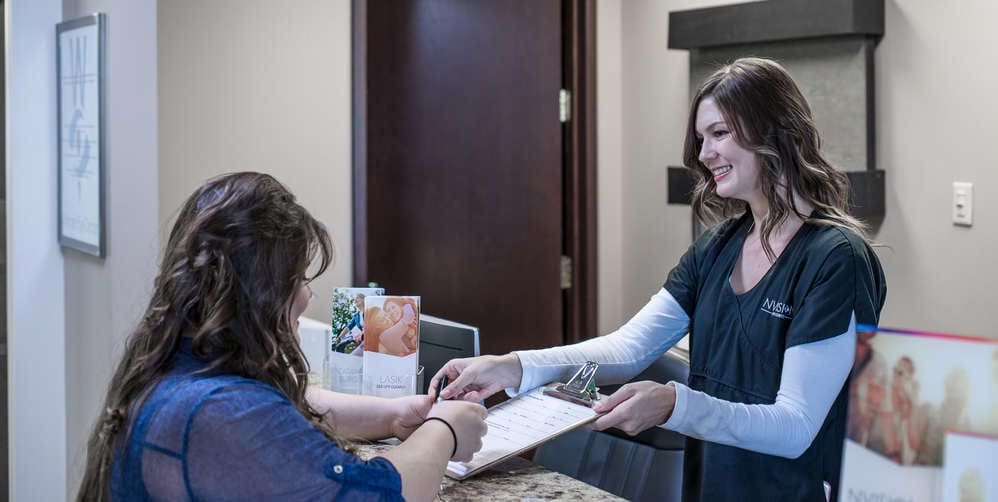

Conditions
Presbyopia
What is Presbyopia?
Sometime in the early-to-mid-forties, you start to lose flexibility in the eye’s natural lens. This decreased flexibility makes it difficult to view near objects when wearing glasses or contacts. People with early presbyopia often notice they need more light to read, and have to hold reading material at arm’s length to focus. With the passage of time, reading glasses or bifocals/progressives are needed for all near tasks.
Common Questions About Presbyopia
What is presbyopia?
Presbyopia is a vision condition in which your natural crystalline lens of your eye becomes less flexible – becomes harder to change in shape to accommodate for near vision needs. These changes make it difficult to focus on near objects. Presbyopia is a natural part of the aging process of the eye. It is not a disease, and it cannot be prevented.
What causes presbyopia?
Presbyopia occurs as a natural part of the aging process. The primary cause is a loss of flexibility in the eye’s crystalline lens, which is responsible for changing its shape to focus on objects at different distances. Unlike nearsightedness, farsightedness or astigmatism, presbyopia isn’t caused by an eye shape. As people age, the lens becomes less elastic and less able to accommodate (change shape) to focus on close-up objects. It’s simply a normal part of the aging process, and since we all age, presbyopia affects everyone.
What are symptoms of presbyopia?
- Difficulty reading small print, such as books, newspapers, or smartphone text.
- Needing to hold reading materials at arm’s length to see them clearly.
- Eyestrain or headaches when performing close-up tasks for an extended period.
- Difficulty seeing in dim or low-light conditions when focusing on near objects.
What are treatment options of presbyopia?
Several treatment options are available to correct presbyopia and improve near vision:
- Reading Glasses: These are the simplest and most common solution for presbyopia. They are designed to magnify close-up objects, making reading and other near tasks easier. Over-the-counter reading glasses are available, or prescription glasses can be customized by an eye care professional.
- Bifocal or Progressive Eyeglasses: These lenses have two or more prescriptions in one lens. The upper part is for distance vision, and the lower part is for close-up tasks. Progressive lenses offer a more gradual transition between the two prescriptions and do not have a visible line on the lens.
- Bifocal or Multifocal Contact Lenses: These are contact lenses that offer multiple prescriptions within a single lens. They provide clear vision for both near and far distances.
- Monovision Contact Lenses: In this approach, one eye is corrected for distance vision, while the other eye is corrected for close-up vision. The brain learns to prioritize one eye for different tasks. Monovision may not be suitable for everyone and may require an adjustment period.
- Refractive Surgery: Procedures like LASIK eye surgery, PRK surgery, or Refractive Lens Exchange (RLE) can be used to correct presbyopia by reshaping the cornea or replacing the eye’s natural lens with a multifocal intraocular lens (IOL). These surgical options are typically considered when individuals want a more permanent solution.
- Corneal Inlays: Some newer treatments involve the implantation of small devices or inlays in the cornea to improve near vision. These inlays work by extending the depth of focus in the eye.
The choice of treatment depends on various factors, including the individual’s age, lifestyle, overall eye health, and personal preferences. Consult with an eye care professional at one of our eye clinics to determine the most suitable presbyopia treatment option for your specific needs.
Treatment Options for Presbyopia
Every patient is different, and therefore we strive to personalize their treatment based on their unique needs. Your NVISION surgeon will recommend the best treatment for your individual needs.

Why Choose NVISION for Eye Care Needs?
Our Experience
Our board-certified surgeons are the most experienced, educated and caring professionals in the eye care industry. Our surgeons have performed over 2,500,000 procedures. More eye doctors have had their surgery performed by an NVISION surgeon than any other provider of eye care.
Patient Care
Every NVISION patient is different, and therefore, we strive to personalize their treatment based on their unique needs. We treat every patient with care, compassion, empathy and professionalism with a promise to deliver the best-in-class patient care.
Technology
We utilize only the most advanced laser and diagnostic equipment available to ensure we can deliver the best outcomes for our patients.

Unparalleled Commitment
Exceptional outcomes. The gold standard in patient care. The #1 Choice of Eye Doctors®. The Vision For Life promise. That’s what makes the NVISION® experience like no other.

Take the Next Step to Clear Vision Today
For over 25 years, NVISION has been the trusted choice in custom vision correction. With 135+ locations nationwide and over 2.5 million procedures performed, our board-certified surgeons combine expertise with the latest technology to deliver exceptional care.
Your journey to better vision starts here.

Book Your Consultation
You're one step closer to life without glasses or contacts. Just answer a few quick questions about your eye exam, and we'll lock in your appointment.
Have a question? Give our experts a call!
877-455-9942
